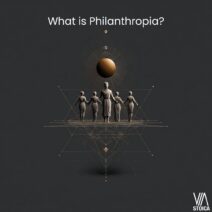What is Eudaimonia? The Stoic Secret to a Deeply Fulfilling Life
What is Eudaimonia?

Eudaimonia (εὐδαιμονία) is the ancient Greek word for “human flourishing.” For the Stoics, it meant more than happiness; it was the result of living with virtue, wisdom, and alignment with your true nature.
Want to go deeper? Check out our Complete Guide to Greek Stoic Terms for more key ideas like adiaphora, logos, and aretē.
The word itself breaks down into three parts:
- Eu-: Good, well, true
- Daimon: Spirit, divine power, inner guide, one’s true nature
- -ia: State or condition of being
So, Eudaimonia (pronounced “yu-day-mo-NEE-a”) literally means “a state of good spirit”, but philosophically, it describes a life where your inner nature reaches its highest potential through moral clarity and self-mastery.
The Three Dimensions of Eudaimonia
- Spiritual Dimension (Daimon)
- Connection to one’s inner guide
- Alignment with universal wisdom
- Expression of one’s true nature
- Quality Dimension (Eu-)
- Excellence in character
- Virtuous living
- Wisdom in action
- State Dimension (-ia)
- Ongoing condition of being
- A continuous state of flourishing
- Sustained way of living
Essential Elements of Eudaimonic Living:
- Alignment with one’s inner guide (δαίμων / daimon) – the divine spark or true self
- Living according to virtue (ἀρετή / arete) and reason (λόγος / logos)
- Developing excellence in character (ἠθική ἀρετή / ethike arete)
- Contributing to society meaningfully (κοινωνία / koinonia)
- Maintaining a state of conscious growth (φρόνησις / phronesis)
- Fulfilling one’s highest nature (φύσις / physis)
- Expressing wisdom (σοφία / sophia) through action (πρᾶξις / praxis)
Eudaimonia vs Regular Happiness
| Aspect | Eudaimonia | Regular Happiness |
| Source | Inner character and virtue | External circumstances |
| Duration | Long-lasting | Temporary |
| Focus | Excellence and meaning | Pleasure and satisfaction |
| Dependency | Independent of fortune | Dependent on events |
| Goal | Character development | Positive emotions |
A Deeper Understanding of Eudaimonia
At its core, Eudaimonia represents the fulfillment of human potential through virtuous living. Unlike modern concepts of happiness that often focus on positive emotions or life satisfaction, Eudaimonia encompasses:
- Living according to reason and wisdom
- Developing excellence in character
- Contributing meaningfully to society
- Achieving genuine self-realization
- Fulfilling one’s true nature
Why is Eudaimonia Central to Stoicism?
The Stoics viewed Eudaimonia as the ultimate goal of human life, but their interpretation had distinct characteristics:
The Stoic Perspective
- Virtue as the Only True Good
- The Stoics believed that virtue alone was sufficient for Eudaimonia
- External circumstances cannot prevent a virtuous person from achieving well-being
- Happiness flows naturally from living according to virtue
- Independence from External Factors
- True well-being doesn’t depend on wealth, health, or social status
- External “goods” are considered preferred indifferents
- Focus on what’s within our control
- Alignment with Nature
- Living in harmony with the rational order of the universe
- Understanding and accepting our role in the cosmic order
- Using reason to guide our actions
What is Stoicism? Find out more about the philosophy itself.
How the Stoic defines Eudaimonia
The Stoic conception of Eudaimonia differs from other ancient philosophies in several key ways:
- Complete Self-Sufficiency
- Well-being depends solely on virtue
- External circumstances cannot diminish true happiness
- Focus on internal rather than external goods
- Rational Living
- Using reason to understand the world
- Making decisions based on wisdom rather than emotion
- Developing clear judgment and understanding
- Moral Excellence
- Cultivating the four cardinal virtues: wisdom, justice, courage, and temperance
- Developing character through consistent practice
- Striving for moral progress
Practical Applications of Eudaimonia
Daily Practices for Modern Life
- Morning Reflection
- Set intentions aligned with virtue
- Review potential challenges
- Plan responses to difficulties
- Mindful Decision-Making
- Ask: “Is this contributing to my character?”
- Consider long-term consequences
- Focus on what’s within your control
- Evening Review
- Assess actions against virtuous standards
- Learn from mistakes
- Plan improvements for tomorrow
Interested in Stoic quotes? Go to the largest list of verified Epictetus quotes online.
Simple Exercises to Develop Eudaimonia
- The View from Above
- Practice perspective-taking
- Consider your place in the larger world
- Reflect on what truly matters
- Values Clarification
- Identify your core principles
- Align actions with values
- Make conscious choices
- Virtue Journaling
- Record daily opportunities for virtue
- Track progress in character development
- Document lessons learned
Common Questions About Eudaimonia
How is Eudaimonia Different from Regular Happiness?
Regular happiness often focuses on pleasure and positive emotions, while Eudaimonia emphasizes excellence, virtue, and meaningful living. It’s the difference between temporary pleasure and lasting fulfillment.
Can Anyone Achieve Eudaimonia?
Yes, the Stoics believed that Eudaimonia is accessible to everyone willing to develop their character and live according to reason and virtue. It requires practice and dedication, but isn’t limited by external circumstances.
How Long Does it Take to Develop Eudaimonia?
Eudaimonia is a continuous journey rather than a destination. While progress can begin immediately, developing genuine excellence of character is a lifelong pursuit.
Conclusion: The Modern Relevance of Eudaimonia
In today’s world of quick fixes and instant gratification, the Stoic concept of Eudaimonia offers a more sustainable path to well-being. By focusing on character development, rational decision-making, and virtuous living, we can achieve a form of happiness that’s more resilient and meaningful than mere pleasure or temporary satisfaction.
Want to explore more Stoic Practice?
Book a free consultation with one of our Stoic Coaches to get support. Or read about the other Stoic Philosophy Terms here. Listen to the Via Stoica Podcast on Spotify, Apple Podcasts, or YouTube.
Author Bio
Benny Voncken is the co-founder of Via Stoica, where he helps people apply Stoic philosophy to modern life. He is a Stoic coach, writer, and podcast host of The Via Stoica Podcast. With almost a decade of teaching experience and daily Stoic practice, Benny creates resources, workshops, and reflections that make ancient wisdom practical today.
Related Posts
-
 Inner Life Terms
Inner Life TermsWhat Are Values? Principles That Guide Action and Display Nature
What are Values? Most people don’t wake up thinking about their values. They notice them indirectly, when something feels slightly misaligned. When a choice looks right on paper but leaves a faint sense of resistance. When success arrives, yet doesn’t land the way it was expected to. Values are often mistaken for opinions, preferences, or […]
Read more -
 Via Stoica Podcast
Via Stoica PodcastA Stoic Conversation with Jason Nelson: Six Seeds for a Happier Life
What if happiness is not something you achieve one day, but something you practice every day? In A Balm for Your Soul: Six Seeds for Happiness, Jason Nelson offers a grounded and humane answer to a question many people quietly struggle with: Why does life still feel off, even when things look good on paper?Rather […]
Read more -
 Greek Stoic Philosophy Terms
Greek Stoic Philosophy TermsWhat Is Philanthropia? How Stoicism Views Love for Humankind
What Is Philanthropia? Philanthropia in Stoicism is the cultivated disposition to care for human beings simply because they are human. It describes a rational, practiced goodwill toward others that flows from understanding our shared nature, rather than from emotion, obligation, or reward. This concept matters today because modern life often treats kindness as optional, sentimental, […]
Read more


Comments 0